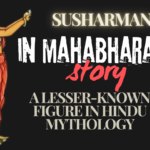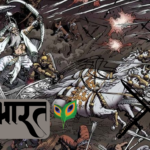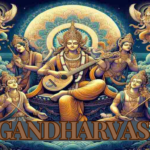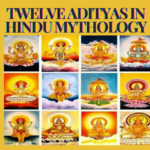In Vedic literature, Lord Indra stands as a towering figure, a deity of immense power and authority. As the king of the gods, Indra’s influence and dominion over natural phenomena, particularly those related to water and war, are unparalleled. However, beyond his celebrated victories and divine status, Indra’s mischievous nature offers a unique perspective into his character, making him one of the most complex and intriguing deities in the Rigveda.
Indra: The Supreme Deity of Vedic Hinduism
At the height of his worship, Indra was revered as the most important deity in Vedic Hinduism. His presence is ubiquitous in the Rigveda, where he is celebrated in countless hymns for his mighty deeds. Indra’s primary role as a warrior deity is most famously illustrated in his battle with the demon Vritra, who personified drought and chaos. By slaying Vritra, Indra is said to have released the waters and restored cosmic order, earning him the title of rain-giver and protector of humanity.
Yet, despite his heroic deeds, there is a playful and, at times, mischievous aspect to Indra that sets him apart from other gods. This duality—of being both a savior and a trickster—adds depth to his character and reflects the complex nature of divine power in Vedic tradition.
The Mischievous Side of Indra
While Indra is undoubtedly a benevolent deity, his mischievous side often manifests in tales of his exploits among gods, humans, and demons alike. This aspect of Indra is not merely an anecdotal detail but a fundamental part of his divine persona.
Indra’s Interactions with Other Gods.
One of the most well-known tales of Indra’s mischief involves his rivalry with Sage Gautama. According to the story, Indra coveted the sage’s wife, Ahalya, and devised a plan to deceive the sage. Disguising himself as Gautama, Indra approached Ahalya, leading to a scandal that resulted in curses and penance for both Ahalya and Indra. This episode highlights Indra’s cunning nature and his ability to manipulate situations to his advantage, even if it means crossing ethical boundaries.
Another example of Indra’s trickster tendencies can be seen in his interactions with other gods, particularly Vishnu and Shiva. Although these deities are often depicted as allies, Indra’s jealousy and desire for supremacy sometimes lead him to challenge their authority, resulting in cosmic battles and power struggles. These stories not only illustrate the volatile nature of divine politics but also emphasize the importance of humility, a lesson that Indra himself learns through his tribulations.
Indra’s Exploits Among Mortals
Indra’s mischievous actions are not limited to the celestial realm; he frequently intervenes in the affairs of humans as well. In many tales, he tests the devotion and morality of mortals, often by disguising himself or creating illusions. These tests, while seemingly cruel, are intended to reveal the true nature of human beings and serve as lessons in virtue and vice.
For instance, in the story of King Harishchandra, Indra challenges the king’s commitment to truth and righteousness by placing him in difficult situations. Although Harishchandra suffers greatly, his unwavering adherence to his principles ultimately earns him a place in heaven, demonstrating the rewards of steadfastness and moral integrity.
In another tale, Indra takes the form of a Brahmin to test the generosity of the Pandava king Yudhishthira. By requesting seemingly impossible offerings, Indra pushes the king to the brink of despair, only to reveal his true identity and reward Yudhishthira’s unshakable faith and generosity. These stories highlight Indra’s role as a tester of humanity, using his mischief to expose the strengths and weaknesses of those he encounters.
Indra’s Decline in Worship
Despite his prominence in Vedic literature, Indra’s worship has significantly declined over time. As Hinduism evolved and new deities such as Vishnu and Shiva gained prominence, Indra’s role as the supreme deity diminished. Today, while still respected as a powerful god, Indra is no longer at the center of Hindu worship.

Several factors contribute to this decline. Firstly, Indra’s mischievous nature and moral ambiguities may have made him less appealing to later worshippers who preferred deities embodying unwavering virtue and spiritual guidance. Additionally, the rise of Bhakti movements, which emphasized personal devotion to a single god, shifted the focus away from the Vedic pantheon and towards more compassionate deities.
However, even though Indra’s worship has waned, his mythology and stories continue to play a vital role in Hindu culture. His complex character serves as a reminder of the multifaceted nature of divinity, where both light and darkness coexist.
The Symbolism of Indra’s Mischievous Nature.
Indra’s mischievous nature is not merely a collection of stories meant to entertain. Rather, it serves a deeper purpose in Vedic thought. Indra’s actions, whether just or unjust, reflect the unpredictable nature of the cosmos. Just as storms can bring both destruction and renewal, Indra’s mischief represents the dual aspects of creation and destruction that are inherent in the universe.
Moreover, Indra’s tales remind us that even the most powerful beings are not immune to flaws. His arrogance, jealousy, and impulsiveness are not just weaknesses but also lessons for both gods and mortals. By acknowledging and learning from these flaws, Indra’s mischievous nature becomes a catalyst for growth and understanding in the grand narrative of Vedic mythology.
Disclaimer : While Writing this post have taken some content reference from different blog posts around the web and also chatgpt. If you think I have directly copy paste your content ,please contact me . I assure you that I will remove the content within 24 hours.





